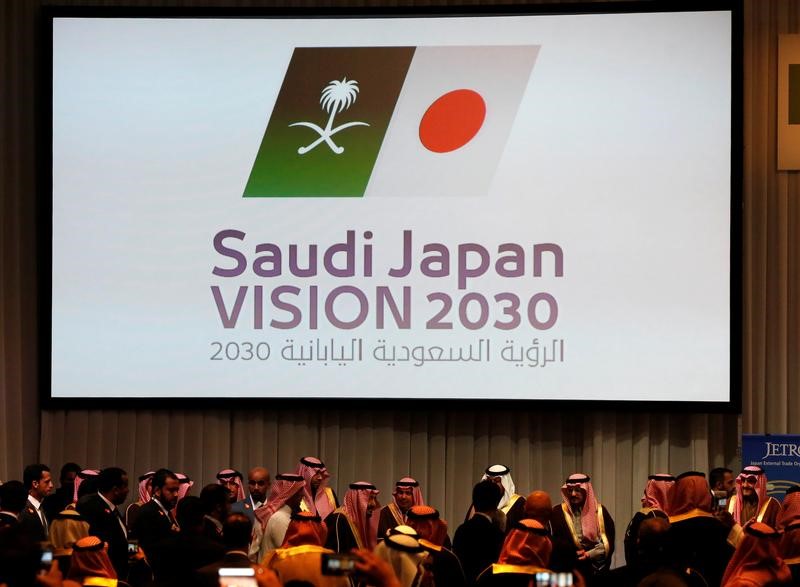By Henning Gloystein
SINGAPORE (Reuters) - Saudi King Salman's lavish tour of Asia, arriving in each country on a golden escalator with 400 tonnes of luggage, had a hardnosed marketing mission - to cement the kingdom's place as leading oil supplier to the world's biggest consumer region.
The string of deals inked on his three-week tour to Malaysia, Indonesia, Japan and China also point to a fresh strategy, one to increase Saudi leverage over refined product and petrochemical markets, known as the downstream sector.
"Our strategy is about growth in the downstream," said Amin Nasser, chief executive officer of state oil company Aramco, told Reuters on Sunday. "The growth in that sector is very important, and anything integrated between refining, petrochemical, with marketing and distribution, is of interest to us."
Saudi Arabia's main influence on oil markets has been via the Organization of the Petroleum Exporting Countries (OPEC), of which it is the de-facto leader.
But OPEC's ability to control prices by turning the oil pumping spigots on and off has waned as non-OPEC producers like Russia and, more recently, U.S. shale drillers, have ramped up output and eroded its grip on market share.
One indication of a shift in Saudi strategy came on the first leg of the tour in Kuala Lumpur. Aramco signed a deal to take a $7 billion investment, in a joint venture with Malaysia's state oil company Petronas in a refinery and petrochemical project known as RAPID (Refinery and Petrochemical Integrated Development).
'THE WINDOW'
Under construction in Malaysia's southern Johor state, RAPID is just across a narrow strait from Singapore, Asia's oil trading hub. Some 70 percent of the oil for the project, set to start in 2019, will come from Saudi Arabia, giving the kingdom a key outlet for its crude in Asia, the world's fastest growing market. It is Armaco's largest refinery project outside the kingdom.
Aramco also recently made a deal with Indonesia's Pertamina over a $5 billion expansion of the country's largest oil refinery, for which Armaco will supply the crude.
"The investments are intended to enhance Aramco's competitive position in Southeast Asia," said Ihsan Buhulaiga, a Saudi economist.
The Malaysian investment also allows the Saudis to join the hub of refineries in and around Singapore that help determine fuel prices in the region.
Price agency S&P Global Platts (N:SPGI) assesses dozens of fuel products during a set time every day, based on deliveries in and out of this region. Platts calls it Market-on-Close, but traders dub it "the window", and it influences pricing of oil products worth billions of dollars each day.
While crude and fuel products by many companies flow in and out of the pricing region, known as FOB Straits. But the only refineries now in this price region are operated by U.S. Exxon (N:XOM), Anglo-Dutch Royal Dutch Shell (L:RDSa), and Singapore Petroleum Corp (SPC), owned by PetroChina (SS:601857).
"When you control refining capacity with the capability to deliver petroleum products into the window, you have access to a physical outlet which also plays a key role in daily price discovery," said John Driscoll, director of consultancy JTD Energy in Singapore.
ARAMCO IPO
The Saudi move deeper into refineries and petrochemical plants would likely help the potential valuation of Aramco in what could be the world's largest-ever initial public offering.
Deputy Crown Prince Mohammed bin Salman, who oversees the kingdom's economic policy, has said the sale is expected to value Aramco at $2 trillion or more. Analysts have estimated a valuation between $1 trillion and $1.5 trillion.
Singapore, along with Hong Kong and Tokyo have been mentioned as possible exchanges where Aramco's shares would be traded. The primary listing will be on Saudi Arabia's domestic exchange, and Riyadh is also looking at New York or London for the secondary listing.
Aramco's joint ventures in Malaysia, Indonesia and elsewhere are not only aimed at increasing its refining capacity. Its new deals in the region would also greatly increase its participation in the petrochemical sector, which involves all forms of plastics and where profits have soared thanks to strong demand.
"We have capacity of about 5.4 million barrels per day of participated refining capacity, and our target is to reach 10 million barrels by 2030," Aramco's Nasser said.
Ultimately, the big prize is China, where the Saudis signed deals that could be worth as much as $65 billion during the last leg of the king's Asian tour, covering energy, manufacturing and even a theme park in the kingdom.
The deals included a memorandum of understanding between Aramco and China North Industries Group Corp (Norinco) to look into building refining and petrochemical plants in China.
John Sfakianakis, director of the Riyadh-based Gulf Research Centre, said that the trip was "the beginning of a long-term strategy of Saudi Arabia to open itself to Asian investors and vice versa" as part of its Vision 2030 policy to diversify its economy beyond crude exports.
